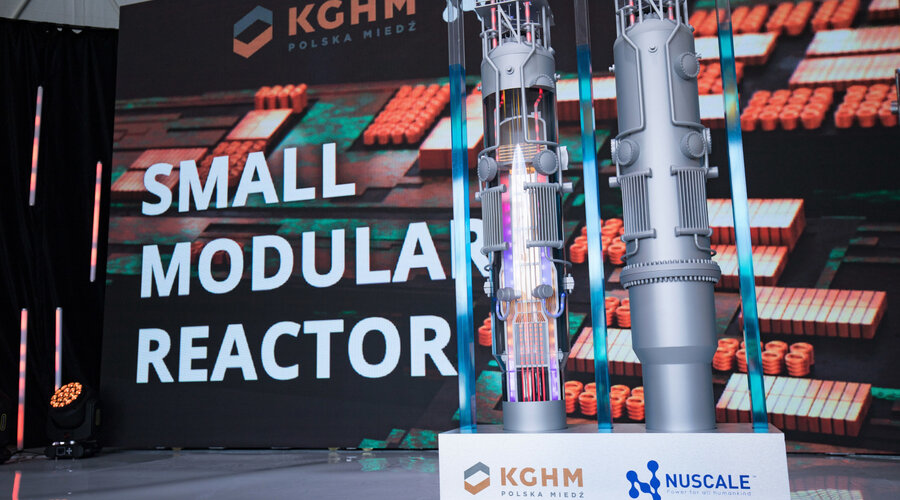A step closer to nuclear energy in KGHM. NuScale Power’s design certified in the USA
In February last year, KGHM signed an agreement with the American company NuScale Power to begin work on deploying small modular reactors (SMRs) in Poland. The technology offered by NuScale Power has been certified by the US Nuclear Regulatory Commission, thus becoming the first SMR design approved for use in the United States and the seventh nuclear design certified to date.
“At KGHM, we are closely following the development of the SMR technology around the world. The US regulator’s decision is a landmark moment that definitely brings us closer to the fulfillment of our own nuclear plans. This is an important signal for us that confirms that small modular reactors are not just a vision of the future, but the most feasible answer to the energy needs of large industry facilities,” pointed out Tomasz Zdzikot, the CEO of KGHM Polska Miedź S.A.
In the nuclear power industry, design certification is carried out to minimize investment risks. “The final certification obtained by NuScale Power provides investors with a guarantee that the findings contained therein are binding,” emphasized Prof. Ludwik Pieńkowski, a KGHM expert. “Its issuance by the US Nuclear Regulatory Commission (NRC) is the final step in a process that started in January 2017 for 50 MW modules and a modular unit with a total capacity of 600 MW consisting of 12 modules. NuScale Power’s modified design assumes that power units will be equipped with 77 MW modules, and the NRC has just launched its certification process,” he added.
Groundbreaking and the only one in the world
NuScale Power’s modular light-water reactor nuclear power plant technology provides energy for power generation, district heating, desalination, hydrogen production, and other process heat applications. This breakthrough technology is the only small modular reactor technology that has been certified by the US Nuclear Regulatory Commission.
“The official certification of NuScale Power’s Small Modular Nuclear Reactor (SMR) by the US Nuclear Regulatory Commission (NRC) is a historic step that brings us closer to a future where the world is powered exclusively by clean energy. The NRC certification makes NuScale Power’s VOYGR™ nuclear power plant design ready for deployment by our customers in a short period of time,” argued John Hopkins, the president and CEO of NuScale Power.
According to Hopkins, the NRC took on a huge challenge, as it had to review the certification application, which included more than two million pages of detailed technical documentation. “NuScale’s small modular reactor is the first and only SMR design to date to reach this milestone, which was made possible by years of hard work by NuScale team members, whose commitment to the research, development, and testing necessary to prove the unparalleled safety of our technology has never faltered,” concluded NuScale Power’s CEO.
Nuclear energy as an element of transformation
In July 2022, KGHM submitted an application to the National Atomic Energy Agency (PAA) for a general opinion on selected conditions to allow the construction of a 462 MW modular nuclear power plant consisting of 6 modules, each with a capacity of 77 MW. The application was prepared based, among other things, on design documentation that has just received the final certification in the United States.
The small nuclear reactor design is directly related to the KGHM’s Climate Policy whose main goals are to reduce greenhouse gas emissions and achieve climate neutrality by 2050.
KGHM’s ambition is to successfully increase the share of renewable energy sources and in-house production in meeting its energy needs. The company has its own low-emission generation facilities powered by gaseous fuel. It also develops renewable energy projects, including photovoltaic power plants on land it owns.
US administration’s support for the SMR technology
KGHM’s American partner can count on the support of the US government. During last year’s G7 summit, President Joe Biden cited NuScale Power as an example of a provider of technologies that strengthen the energy security and confirmed his support for the investment projects planned in Europe.
Following the decision of the US Nuclear Regulatory Commission, the US Department of Energy also confirmed its support for the NuScale design. “SMRs are no longer an abstract concept. They are viable and ready for deployment thanks to the hard work by NuScale, the academic community, our domestic laboratories, industry partners, and the NRC. This is innovation at its best,” said Kathryn Huff, the head of the Office of Nuclear Energy at the Department of Energy.
It needs to be emphasized that a study by the Ministry of Climate and Environment shows that as many as 74 percent of Poles support the construction of nuclear power plants in our country.



